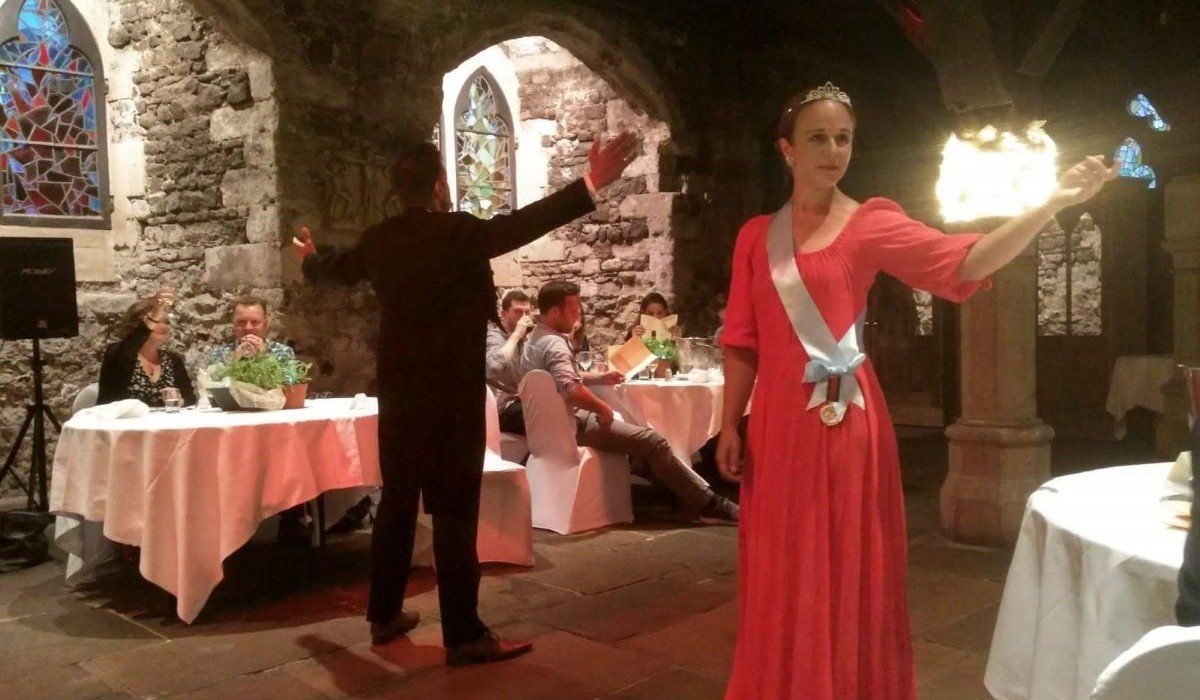Madeleine Kasson presents 'A Taste of Shakespeare', a good representation of her experiences at Lucy Cavendish.
A Taste of Shakespeare is a suitable representation of my myriad experiences since matriculating at Lucy Cavendish. When I finished my undergraduate degree at UCLA, I stayed in Los Angeles to pursue my acting career. Six months and no Hollywood films later, I decided a change was in order. Unwilling to move on from acting, but wary of the unpredictable industry, I applied to both a drama school and a graduate program. Cambridge said yes, and I couldn’t say no. (Drama school also said yes…but they were too late.)

During my time at Cambridge, I co-founded a dining society and served as Entertainments Director for the Graduate Union. My MPhil year was one of my most socially fulfilling years (so far). Meeting new people, bringing them together, and creating shared experiences proved even more rewarding than my academic pursuits. This realization led me to consider a future beyond academic psychology. After graduating, I nearly took up a permanent position as the GU Ents Director; instead, however, I took up a place at a London drama school.
While studying acting full time, I supported myself through private tutoring and eventually came to work with Tutorfair- a company and foundation that aims to level the playing field of early education through tuition. Whilst there, I met fellow tutor and theatre director, Jane Moriarty. We discovered a shared passion for theatre, education, and Shakespeare, in particular. Together, we have pursued several Shakespeare-themed collaborations, from a children’s social media channel to A Taste of Shakespeare.
So, what is this Taste of Shakespeare then? Simply put, it’s a literal and figurative tasting menu of the Bard’s best fare. An immersive dining experience, it combines world-class Shakespearean performance, indulgent dining, and historically relevant locations. The goals are to bring the audience deeper into the world of the play, design an all-in-one evening experience, and share Shakespeare -which I found so fun- with an audience who may give traditional stagings a miss.
In a medieval London locale, guests are treated to scenes from seven Shakespeare plays- a little taste of everything Shakespeare has to offer. Some infamous, some rarely performed, the scenes are united by that all-important theme: food. As the audience watch the performance from their front-row seats at a dining table, they are served a 7- course meal. The service is timed, and dishes designed, to pair perfectly with the performance. The crowd eats a tantalizing beef and mustard course while Kate is deprived of the same by Petruchio (Taming of the Shrew, Act IV Scene iii), and tucks into a juicy pie served by none other than Titus Andronicus himself (Act V scene iii). New iterations of the show will explore different scenes and different menus. Our original production opened in Ely Place on the same day as their annual Strawberry Fayre- a celebration of the once-famous strawberry garden there, immortalized in Shakespeare’s Richard III (Act III scene iv). It was staged in the crypt of St. Etheldreda’s, where Katherine of Aragon famously dined separately from Henry VIII, signaling the beginning of their end. This ending, dramatized in Henry VIII (Act II scene iv), closed our initial production alongside charcoal chocolate macarons- a bittersweet taste of the history of our performance space.
The production strikes a balance of modern and traditional. While some scenes have modern costumes, props and set pieces, others inhabit the medieval venue and reflect Shakespearean history. In choosing what to modernize, Jane and I felt that having a gender-balanced and racially diverse cast was essential. This conscientious casting was important not only to reflect modern society in the theatre industry, but also to present something that would give a contemporary audience a comparable experience to Shakespeare’s intended audience of contemporaries. While, in the 16th century, women on stage or in roles of power would be notable, in the 21st their absence in these positions is noted. As such, re-gendering roles somewhat ‘neutralizes’ the unintended impacts of gender, allowing the audience to instead focus on the story, language, and characters which make this text so rich. As with gender, we modernized many elements of Shakespeare, while staying true to the origins of the work. For example, we devised a full menu that incorporates Shakespearean food references, but we serve up very modern British cuisine- not medieval mutton.
Creating such a complex production was a huge undertaking for me, personally. While I had experience organizing events, devising shows, and doing most jobs involved in a theatre production, I had no experience of fundraising, marketing in London, designing dining, or creating a box office. It was particularly challenging to navigate the landscape of London theatre/events with such a hybrid production. I have learned new skills, and I have learned when to reach out to collaborators. For our first production, A Taste of Shakespeare partnered with Bleeding Heart Yard Restaurants and St. Etheldreda’s Cathedral who provided the food and venue. It was important to me that each of the three main components of the experience- food, location, and performance- were of equal quality. I was fortunate enough to have Jane direct the performance and cast our amazing actors, all of whom have worked with the Royal Shakespeare Company. It was exhilarating to watch these talented groups bring to life something that started as a Shakespearean foodie fantasy.
Due to its elaborate nature, the production is not ongoing but, rather, operates as a ‘pop-up’. (There’s a strong chance it will pop-up again in December for large group/Christmas party bookings.) For my next project, I hope to create a long-run, immersive, restoration comedy production- though I’m told the genre is a little ‘niche’. It will be one fopping good party.
For more info, or to book for December, you can email Madeleine at tasteofshakes@gmail.com.
By Madeleine Kasson. Social and Developmental Psychology, 2010
The opinions expressed in this article are the author’s own and do not necessarily reflect the view of Lucy Cavendish College or the Lucy Cavendish College Alumnae Association.




